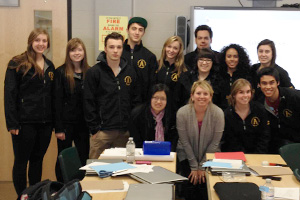UOIT faculty member’s workshop equips students to end bullying
August 11, 2014

At least one in three adolescent students in Canada having reported being bullied, according to the Canadian Institutes of Health Research. Jennifer Laffier, an expert in bullying behaviour among children and adolescents at the University of Ontario Institute of Technology (UOIT), has developed a program - Hero Power versus Coward Power© - to empower children and put an end to bullying.
Hero Power versus Coward Power© teaches children that mean behaviour is uncool, and gives them the confidence to stand up to bullies in a positive way. Laffier, Senior Lecturer with UOIT’s Faculty of Education, has been running this program for the past six years. She wrapped up this year’s workshops for the Near North School Board in June with awards ceremonies for Land of Lakes Senior Public School in Burk’s Falls, Ontario, and Almaguin Highlands Secondary School in South River, Ontario, where she has worked with students for the past two years. The workshop’s success was recently highlighted in a NorthumberlandNews.com article.
The program is based on a theory Laffier developed out of her counselling practice and personal experiences as a bully. It explores the concept of power as a driving force for bullying behaviours.
“All people strive for power, which in itself is not bad,” she explains. “But it’s the type of power we strive to achieve that makes the difference between hero and cowardly acts.”
Here’s how she describes the two power categories:
- Coward power, which lies at the root of bullying, is gained through negative and easy means; making others feel bad so we can feel good, controlling others, or take the easy road through lying, cheating or other negative behaviours. This kind of power is not fulfilling and therefore can be addictive.
- Hero power is gained through doing good things even when it’s more difficult or time-consuming – for example, helping others, volunteering, telling the truth, standing up for others or going against the crowd. This kind of power can be used to stand up to or discourage bullying. It is more fulfilling and has a lasting impact on self-esteem.
“We teach the students they should not feel bad for wanting power, but they should make sure they choose the right kind of power,” Laffier says. “We all make mistakes and sometimes it’s hard to choose hero power. It tests your courage. But constant use of coward power is not a sign of strength, confidence, or coolness. It is the exact opposite; ultimately, it’s a sign of weakness, and that’s what we want children and youth to recognize. Most bullies need power and choose cowardly ways to achieve power. If they were given opportunities to experience hero power it would be more fulfilling and help end the behaviour.”
During the workshop, Laffier works with students to help them redefine ‘coolness’ and think about what they’re going to do next time they see a friend doing something mean.
“If children can start to see this behaviour as negative, undesirable and ‘uncool’ within their peer group, they can change bullying,” she says. “Change cannot come from the outside, from older people and authorities telling kids what to do. It’s only through attitude changes within their social circles that children can start to sanction the behaviour of their peers.”
Laffier works with each school board for two years to get the message out. In the first year she visits elementary schools and high schools to tell her personal story of being a bully and sets up various initiatives for students and teachers to discuss and recognize the difference between hero and coward power. In the second year, she trains the high school students to be Hero Power Ambassadors and Leaders. These students then work with the elementary schools to continue the Hero Power versus Coward Power© program. This strategy has been successful so far, she says, because “younger kids look up to senior students and respect their messages.”
In addition to her research and teaching role at UOIT, and her work as counsellor and art therapist in the Durham Region, she has visited schools across Ontario for the past 18 years to raise awareness about bullying.


